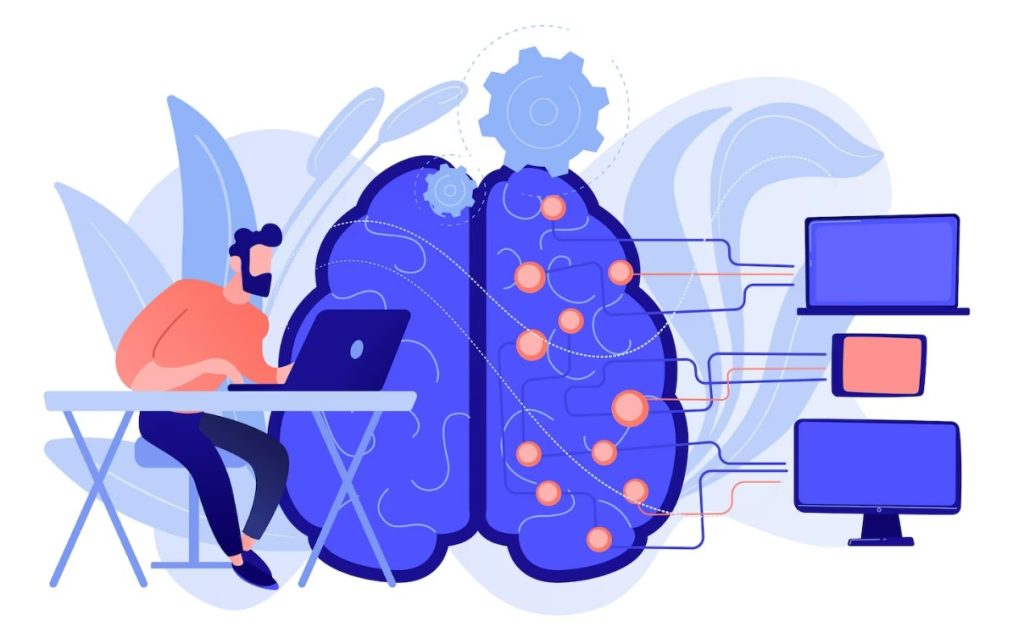If you’ve ever been curious about artificial intelligence (AI) and want to know how to become an AI engineer , you’re in the right place. In this article, we are going to explore the key steps you can take to achieve your goal of becoming an AI engineer. From acquiring technical skills to building a strong academic foundation, we’ll break down the path to becoming an AI expert.
What is AI?
When we talk about Artificial Intelligence (AI) we refer to the simulation of human intelligence processes by programming computer systems. These systems are designed to perform tasks that would normally require the use of human intelligence, such as reasoning, learning, problem solving, and decision making.
AI encompasses a variety of approaches, including machine learning, artificial neural networks, and many others. Its objective is to create machines and systems capable of imitating and surpassing human cognitive capacity in different areas.
What does an Artificial Intelligence engineer do?
An Artificial Intelligence Engineer builds artificial intelligence models using machine learning algorithms and deep learning neural networks to obtain business information, which can be used to make business decisions that affect the entire organization.
Steps to become an AI engineer
1. Have adequate educational training
The first step is to get a solid educational foundation. Most AI engineers have degrees in areas such as computer science, statistics, or mathematics. An advanced degree, such as a master’s in artificial intelligence or a PhD, can give you a competitive edge in your industry.
2. Master mathematics and programming
Mathematics and programming are fundamental in AI engineering . It is crucial to have a solid knowledge of algebra, calculus and statistics. Also, master programming languages such as Python , R , Java , and C++ to build and deploy models.
3. Learn from Machine Learning and Deep Learning
Machine learning and deep learning are cornerstones of AI. Familiarize yourself with machine learning algorithms and deep learning techniques, such as neural networks, to understand how machines can learn and improve with experience.

4. Participate in hands-on projects
Apply your knowledge to practical projects. Developing AI projects will help you better understand the concepts and build a portfolio that demonstrates your skills to potential companies.
Theory is important, but practice is essential. Participating in practical projects gives you the necessary experience to apply your knowledge in real world situations. Consider developing machine learning models that solve specific problems or improve existing processes.
5. Construction of a portfolio
Having a strong portfolio is a great way to showcase your skills as an AI engineer . Include projects you have worked on, detailing the problems you solved and how you implemented AI solutions. Having a good portfolio can make a difference when looking for job opportunities. How can you do it?
- Create Independent AI Projects: Develop independent AI projects to show off your skills. This could include anything from creating a chatbot to predicting patterns in data sets.
- Contribute to open source projects: Join AI-related open source projects to contribute to the community and learn from other developers.
- Take part in AI competitions : AI competitions are a great way to challenge yourself and show off your skills. Platforms like Kaggle offer a variety of exciting challenges.
6. Stay updated
AI is a constantly evolving field. Stay up to date with the latest research, breakthroughs, and trends by attending conferences, workshops, AI applications courses , and refresher courses. Additionally, follow blogs and scientific publications to learn about emerging trends and best practices in the sector.
- Constant research and continuous learning: AI is constantly evolving. Stay on top of the latest advances through continuous research and learning.
- Attend conferences and workshops: Participate in AI conferences and workshops to meet experts and keep your knowledge up to date.
- Join online communities: Join online forums and AI communities to discuss ideas, ask questions, and make valuable connections.
Don’t miss the Master in SEO and Generative Artificial Intelligence
What essential skills do you have to have to be an AI engineer?
Programming
Programming is the foundation of AI engineering. You must be able to write clean and efficient code to develop and improve AI algorithms.
Analytical thinking
Analytical thinking allows you to break down complex problems into manageable parts and develop effective solutions.
Knowledge of Databases
An AI engineer needs to work with large data sets. Understanding databases and storage techniques is essential.
Problem resolution
Problem solving is a key skill. You must be creative in identifying unique solutions to difficult challenges.
Interdisciplinary collaboration
AI intersects with many disciplines. The ability to collaborate with experts in different fields will improve the quality of your projects.
Ethics and Responsibility
AI engineers must consider the ethical implications of their creations, such as bias in algorithms.
Becoming an AI engineer is an exciting yet challenging journey. It requires dedication, ongoing training, technical skills and a passion for technological innovation. By mastering programming, machine learning, and developing analytical skills, you will be able to contribute significantly to the exciting field of artificial intelligence. By following these steps and staying committed to learning, you will be on the right path to building a successful career in the field of artificial intelligence. The future of artificial intelligence is in your hands!
What did you think of the article? Do you think you have everything to become an AI engineer? Are you missing any feature that you think is essential? I read you in the comments!
